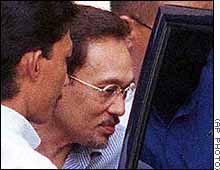
 |
|
| Anwar leaves court on Tuesday | |
KUALA LUMPUR, Malaysia (CNN) -- Malaysia's top police intelligence officer Wednesday described a secret technique to force witnesses to change their statements during his testimony in the trial of former Deputy Prime Minister Anwar Ibrahim .
Police Special Branch Director Mohamed Said Awang told the High Court that the procedure was a "great secret" of the police intelligence unit known as "a turning-over operation," intended to obtain certain statements.
"Basically we do a quick assessment on our target, then we see how the possibilities are to turn over their stand," Mohamed told the court hearing four corruption charges against Anwar.
"If it is a certain political stand, we may neutralize the stand if it is a security threat," said Mohamed, who retires from the Special Branch intelligence unit later this month and is currently on leave.
Mohamed touched on the procedure under questioning by the prosecution, which attempted to prove that Anwar used his power while a cabinet minister to influence a police investigation into accusations he had committed sodomy.
Anwar has pleaded not guilty to five charges of corruption and five of sodomy.
The four corruption charges in the first phase of the trial allege that Anwar asked Mohamed to obtain statements from a man and a woman implicated in allegations of sexual misconduct by the former cabinet minister.
Mohamed said Anwar had asked him to convince the two to retract their allegations of sexual misconduct, and that he had told officers to interview the two and have them retract the allegations.
Asked by the prosecution what questioning procedure was used, Mohamed said: "It is known in the Special Branch as a turning-over operation." The Special Branch is the intelligence arm of the federal police force.
"The procedure is to turn them over so that they will change their stand," he said.
Pressed to elaborate, he said: "My Lord, this is a Special Branch secret. It is a great secret."
The subordinates said they were convinced there was some basis to the allegations. "But despite that, I requested them to go ahead and neutralize them and make them change their stand," Mohamed said.
When the officers returned with the retractions, Mohamed said they were not good enough.
"I wanted it to be more committed. It was not clear enough. I thought the letter was not good enough to be sent to the prime minister," he said. "The sentence construction and the apology wasn't there."
Asked if he was satisfied when the officers returned with fresh retractions, Mohamed told the court: "I would say so, My Lord."
Wesley Gryk of Human Rights Watch called the testimony chilling.
"One thing which was a bit chilling was to hear the former head of Special Branch talking about these special procedures which they have to 'turn over' and to 'neutralize' those whom they were interviewing," Gryk said.
Mohamed told the capital's High Court that Anwar had asked police to arrest the woman, Ummi Hafilda Ali, as well as his former driver, Azizan Abu Bakar, to "put a little fear in them."
As Anwar's trial enters its third day, prosecutors are planning to offer additional testimony that proves the former deputy prime minister used his influence to mask sexual misdeeds.
On Tuesday, the court was told Malaysia's police intelligence unit launched an investigation into sexual misconduct by Anwar in 1992, one year before he was named deputy prime minister and finance minister.
Mohamed was the first of 52 prosecution witnesses expected to take the stand in a case that is likely to have a significant bearing on Prime Minister Mahathir Mohamed's 17-year- reign.
Anwar faces five counts of corruption and five counts of illegal sex acts. He denies the charges and says they were fabricated to eliminate his challenge to Mahathir.
Anwar's corruption charges relate to his attempts to tamper with the evidence that government investigators had collected about his alleged acts of sodomy and adultery.
Defense lawyers are trying to establish that the corruption charges against Anwar are invalid because the special law used to prosecute him is under review. Lawyers said they planned to appeal the ruling by the trial judge to dismiss that plea.
Despite the seriousness of the charges, thousands of Malaysians have openly expressed solidarity for Anwar, participating in street protests since he was arrested on September 20. Stern warnings by the police, tear gas and water cannons have failed to crush the protests.
Mahathir said Anwar was morally unfit to run the Southeast Asian nation and dumped him on September 2.
Also Wednesday, representatives of international human rights and jurist groups were allowed access to the trial.
Only a few had succeeded in gaining entry during the first two days of the trial, but most of the observers who wanted to view the proceedings managed to get into a public viewing gallery on Wednesday.
They were permitted in after harsh criticism followed High Court Judge
Augustine Paul's Monday ruling against giving observer privileges to representatives
of watchdog groups.
The Associated Press
and Reuters contributed
to this report.